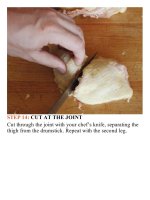The food lab better home cooking through science ( PDFDrive ) 354
Bạn đang xem bản rút gọn của tài liệu. Xem và tải ngay bản đầy đủ của tài liệu tại đây (177.27 KB, 2 trang )
lessagedthemeatwas,themoremoistureitexpelled.Why
isthis?Oneofthesideeffectsofagingisthebreakdownof
meat proteins and connective tissue. This makes the meat
moretender,aswellascausingittocontractlessasitcooks.
Lesscontraction=lessmoistureloss.
Whenallwassaidanddone,inmanycases,themeatthat
was100percentfreshendeduplosingmoreliquidthandryagedmeat.
Finally,asimpletastetestwasthenailinthecoffin:meat
dry-aged for 21 days (the period during which the largest
change in density of the interior meat occurs) was
indistinguishable from fresh meat in terms of flavor. The
improvements were only in texture. It wasn’t until between
the30-and60-daymarksthatnoticeablechangesinflavor
occurred, and during that time period, there was essentially
nochangeininternaldensity.Thus,moisturelossisnottied
toflavorchange.
Q:Whydoesmeatbeingagedstoplosingmoistureafter
thefirstfewweeks?
It’s a matter of permeability. As meat loses moisture, its
musclefibersgetmoreandmorecloselypacked,makingit
more and more difficult for moisture under the surface to
escape.Afterthefirstfewweeks,theouterlayerofmeatis
so tight and tough that it is virtually impermeable to
moistureloss.
Q:Ifit’snotmoistureloss,whatfactorsdoaffectthe
flavorofagedbeef?
A couple of things: The first is enzymatic breakdown of
muscle proteins into shorter fragments, which alters their
flavor in desirable ways. But this effect is completely
secondary to the far more important change that occurs
when fat is exposed to oxygen—it’s the oxidation of fat as
well as bacterial action on the surfaces of the meat that
cause the most profound flavor change, the funkiness you
getinmeatthathasbeenagedforover30days.
It’s true, though, that much of this funky flavor is
concentrated on the outermost portions of the meat—the
partsthatlargelygettrimmedaway—andforthisreason,if
you want to get the most out of your aged meat, it’s
essentialthatyouserveitwiththeboneattached(notthefat
cap, which should be completely removed and discarded).
The outer parts of the bones will hold tons of oxidized fat
andfunkymeat.Thearomasfromthismeatreachyournose
as you’re eating, altering your entire experience. Lovers of
agedsteakalsoprizethespinalis—theoutercapofmeaton
arib-eye—foritsricher,morehighlyagedflavor.
AgingSetup
Q:WhatsortofsetupdoIneedforagingsteakathome?
Isitrelativelysimple?
It’sverysimpleandrequiresvirtuallynospecialequipment.
Therearejustafewthingsyou’llneed:
• Fridgespace.The best thing is to use a dedicated minifridge,sothatthemeatsmellsdon’tpermeateotherfood.
It can get a little . . . powerful.The mini-fridge I kept by
mydeskwhentestingagedmeatwouldfilltheofficewith
the aroma of aging meat if I peeked inside it for even a









